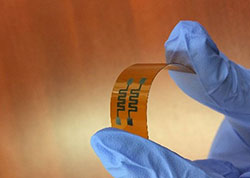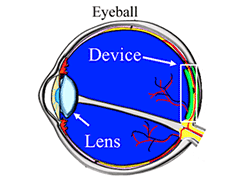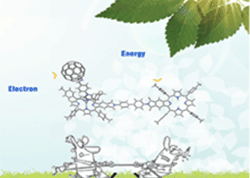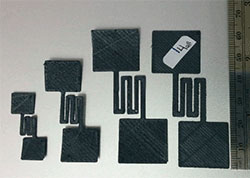A principal goal of PTI will be to establish itself as a leader in innovative research in the Four Focus Areas described below, with multiple faculty and their students working collaboratively to solve pressing problems in topics related to these core foci.
Focus Area 1: Flexible Electronics and Manufacturing

This area covers aspects related to both fundamental and applied research to develop innovative, efficient, and sustainable manufacturing processes using emerging micro- and nanoscale materials for flexible electronics. Flexible and printed electronics using additive manufacturing techniques that are material-conserving and sustainable, is an important area of focus which is also well-aligned with the broader aspects of manufacturing research. These techniques are used to form devices on light-weight, conformable substrates using environmentally-friendly materials and processes, which can enable advances in areas such as wearable electronics, transparent electronics, sensors, among other things.
Focus Area 2: Electronics, Opto-electronics, Sensing and Biomedical Devices

Activities within this Focus Area include: developing energy-efficient, high-performance electronic devices and systems using two-dimensional layered materials and heterostructures of nanocarbons and transition metal chalcogenides for computation, as some examples; electronic and opto-electronic devices for enhanced detection of radiation from the IR, visible, to the UV regimes; developing novel techniques using laser holography for the nanofabrication of 3D photonic crystals; physical and chemical sensors to detect biothreats and toxins for defense and homeland security, including in extreme environments; and biomedical devices for healthcare, that may also be implantable and biocompatible.
Focus Area 3: Energy Harvesting, Storage and Lighting

This is a grand challenge area where research directions include developing efficient renewable energy devices, understanding light-matter interactions in nanoscale materials to enhance transduction from optical to electrical and/or thermal modalities; developing environmentally friendly materials for energy harnessing, storage and lighting for increased sustainability; smart textiles and buildings, LEDs, low-power, low-cost lighting solutions; high-efficiency, lightweight batteries; catalysis for energy storage. Also included here will be more applied and system-level research for the integration of solar cells composed of nanomaterials for energy and power systems.
Focus Area 4: Composites, Coatings and Structural Applications

Research areas of interest in this Focus Area includes developing light-weight, high-strength materials for ground and airborne applications; shape-memory-alloys (SMAs), coatings for thermal and tribological applications for automotive and trucking components; effective tribological coatings for tires that can help fuel-efficiency and improve sustainability, particularly as it relates to the heavier trucking industry; environmental sensors for humidity, temperature, pressure, etc. to enhance safety; smart textiles with embedded sensors; sensors for structural health monitoring of bridge and transportation systems that can promote basic and applied research programs to improve safety and sustainability of transportation systems and related infrastructure. Some of the activities in this area for PTI-affiliated faculty include creating composites of nanomaterials and organic materials using 3D printing to form sensors, such as strain-dependent electrical sensors for wearable electronics, using nanoindentation techniques to study wear and friction.




